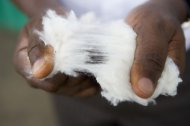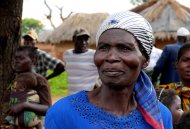 2 years back
2 years back
Cotton produced in Africa (CmiA) aids the Fashion Revolution to encourage people to start asking ‘which makes the cotton fiber for my clothes?’. CmiA-labelled cotton is short for personal and environmental responsablly created cotton in Sub-Saharan Africa. By purchasing the CmiA-labelled garments every customer makes an invaluable contribution to improving the living conditions of African cotton fiber farmers and their families in addition to Africa’s long-lasting future. For CmiA as well as its partners ladies are an essential key to sustainable development within its system.
Nelifa Miti from Zambia is one of the 85, 000 CmiA feminine cotton fiber farmers and person in a cotton women’s club. In an interview, Nelifa we can get an insight into the woman work, the ladies club along with her life:
“My name is Nelifa. I will be women cotton farmer from Zambia and member of our neighborhood Cotton Females Club – the Chatata Women Club. The club is essential for me because I have obtained countless understanding in cotton fiber manufacturing also plants like maize from education we obtain. We understand most readily useful farming practices that destination a great emphasis on new techniques to conserve our liquid and soil. Everything we virtually understand on Club area we do our far better replicate on our specific areas and also this features really already been useful to united states. Loads changed for me since I have entered the club. The degree of income has increased which has decreased poverty inside my house. Another point which is in the same way essential is through this I have learnt to effortlessly communicate with other women in my neighborhood, specifically with a number of our club people whom not result from my town but from those near ours. that is also very important in my experience, ” presents Nelifa Miti herself.
that is also very important in my experience, ” presents Nelifa Miti herself.
“i'm the pinnacle of disciplinary division in club. My friends respect myself, not merely because of this but also for my age. As one of the earliest members of our club and seat of disciplinary department, i will be looked at as a source of knowledge and guidance. We give both guidance as women as to how most useful we are able to achieve our neighborhood, in our agriculture in addition to every day life. Additionally, we give each other help to focus difficult and maintain our households. I do want to see women be creative and enterprising in our communities, in order that they usually do not battle to survive. I am a widow, but I'm in a position to handle my house but been able to take care of my loved ones on my own. Becoming part of it is because of my account in the club. Our club is encouraging even more ladies to start out cotton-growing in our neighborhood, especially people who thought that they can't manage as ladies. However now these are typically attracted in what we are performing and they've got seen that individuals today even possess a company in our team. This has really inspired a lot of women. Our club helps us to stand on our very own two feet, both inside the neighborhood as well as in the cotton manufacturing, ” describes Nelifa further.
 Besides the ladies groups, CmiA supoorts a range of alternative activities to enable ladies in the cotton-growing areas. Included in these are adapting learning sustainable cotton production towards the requirements of feminine members and education female cotton farmers in order to become lead farmers to strengthen their particular role in the training teams. Employees associated with cotton fiber organizations receive learning sex equality and women’s representatives are set up as a typical contact individual inside company. Also, the female farmers included obtain much easier usage of financial loans and their agreements with the cotton fiber businesses to make their particular earnings independantly. Currently, 36 women’s cooperatives each with at the least 25 people in Ivory Coast take advantage of a financial start-up within a joint project.
Besides the ladies groups, CmiA supoorts a range of alternative activities to enable ladies in the cotton-growing areas. Included in these are adapting learning sustainable cotton production towards the requirements of feminine members and education female cotton farmers in order to become lead farmers to strengthen their particular role in the training teams. Employees associated with cotton fiber organizations receive learning sex equality and women’s representatives are set up as a typical contact individual inside company. Also, the female farmers included obtain much easier usage of financial loans and their agreements with the cotton fiber businesses to make their particular earnings independantly. Currently, 36 women’s cooperatives each with at the least 25 people in Ivory Coast take advantage of a financial start-up within a joint project.
About Cotton manufactured in Africa
Cotton produced in Africa (CmiA) is an initiative of this Aid by Trade Foundation (AbTF) that provides support in assisting individuals assist by themselves through trade, enhancing the lifestyle circumstances of cotton fiber farmers and their loved ones in Sub-Saharan Africa. More or less 435, 000 smallholder farmers and including their family people over 3, 2 million individuals from Zambia, Zimbabwe, Mozambique, Malawi, Ghana, and Côte d’Ivoire currently participate in the CmiA system. Through education programs, Cotton built in Africa teaches the cotton fiber farmers about modern, efficient, and eco-friendly cultivation techniques that help all of them increase the quality of their particular cotton fiber, yield higher crops, and thus make a better income. The initiative’s strategy focuses on activating market forces in place of help. An alliance of international textile businesses built-up by CmiA buys the sustainably cultivated cotton and will pay a license fee into the foundation. The permit fees compensated by the demand partners are right reinvested to profit smallholder farmers within the task nations Presently significantly more than 20 textile businesses are part of the demand alliance, including Puma, C&A, Tom Tailor, s. Oliver, the Rewe Group, Tchibo, Engelbert Strauss or the Otto Group. www.cottonmadeinafrica.org











